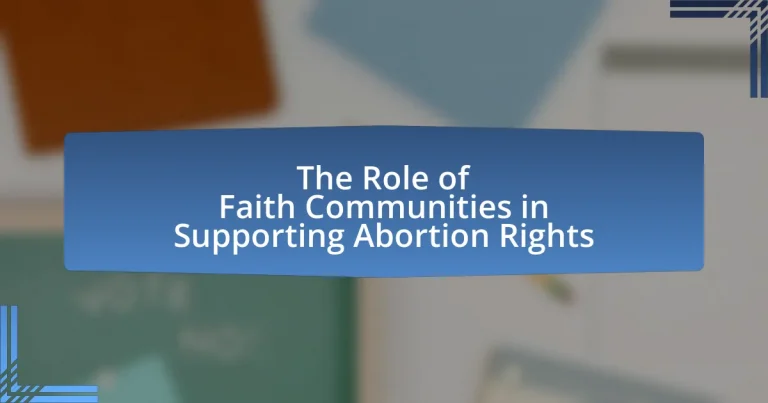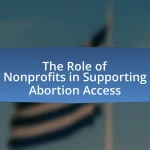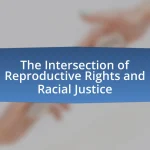The article examines the role of faith communities in supporting abortion rights, highlighting their advocacy for reproductive justice and individual autonomy. It discusses how various faith traditions define their stance on abortion, influenced by theological principles such as the sanctity of life and free will. The article also explores the social and political impacts of faith communities, their mobilization strategies, and the challenges they face in supporting abortion rights. Additionally, it addresses how faith leaders utilize their platforms to promote reproductive rights and the outcomes of their advocacy efforts on public perception and legislation.
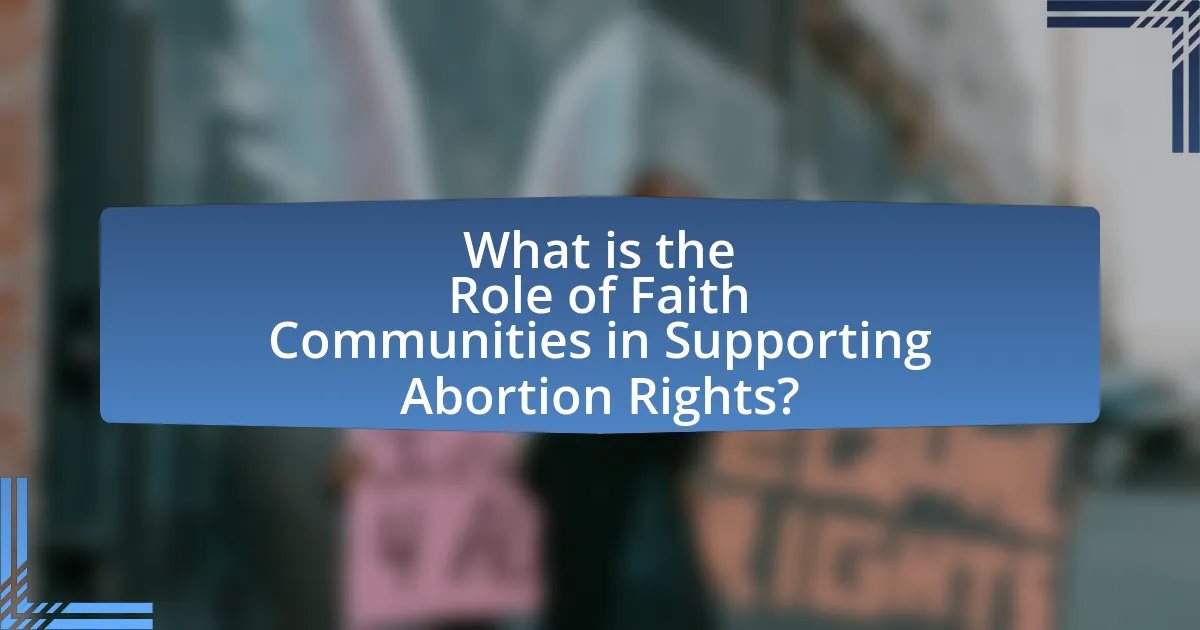
What is the Role of Faith Communities in Supporting Abortion Rights?
Faith communities play a significant role in supporting abortion rights by advocating for reproductive justice and providing a moral framework that aligns with individual autonomy. Many faith leaders emphasize compassion and understanding, arguing that personal circumstances should guide decisions about abortion rather than strict dogma. For instance, organizations like the Religious Coalition for Reproductive Choice unite various faith traditions to promote policies that protect reproductive rights, highlighting that many religious individuals support access to safe and legal abortion. This advocacy is often rooted in interpretations of religious texts that prioritize women’s health and well-being, demonstrating that faith communities can be allies in the fight for reproductive rights.
How do faith communities define their stance on abortion rights?
Faith communities define their stance on abortion rights through a spectrum of beliefs influenced by their theological interpretations and ethical considerations. For instance, many conservative Christian denominations, such as the Roman Catholic Church, oppose abortion, viewing it as morally unacceptable based on the belief in the sanctity of life from conception. In contrast, some progressive religious groups, including certain branches of Judaism and Unitarian Universalism, support abortion rights, emphasizing individual autonomy and the moral complexities surrounding pregnancy. This divergence reflects broader theological frameworks, with statistics indicating that approximately 61% of religiously unaffiliated Americans support abortion rights, compared to 38% of white evangelical Protestants who oppose it.
What theological principles influence their views on abortion?
Theological principles influencing views on abortion include the sanctity of life, the concept of free will, and the interpretation of scripture. Many faith communities emphasize the sanctity of life, arguing that life begins at conception and should be protected, which leads to opposition against abortion. Conversely, some theological perspectives advocate for free will, suggesting that individuals should have the autonomy to make personal decisions regarding their bodies, including the choice to terminate a pregnancy. Additionally, interpretations of scripture vary; for instance, some religious texts are interpreted to support compassion and understanding in complex situations, which can lead to a more supportive stance on abortion rights. These principles reflect the diverse beliefs within faith communities regarding the moral and ethical implications of abortion.
How do different faith traditions approach the topic of abortion?
Different faith traditions approach the topic of abortion with varying perspectives based on their theological beliefs and ethical frameworks. For instance, the Roman Catholic Church firmly opposes abortion, viewing it as the taking of innocent life, grounded in the belief that life begins at conception. This stance is supported by the Catechism of the Catholic Church, which states that human life must be respected and protected from the moment of conception.
In contrast, many Protestant denominations, such as the United Church of Christ and the Episcopal Church, adopt a more nuanced view, allowing for abortion in certain circumstances, such as when the health of the mother is at risk or in cases of rape or incest. These denominations emphasize individual conscience and the moral agency of the woman.
Judaism generally permits abortion, particularly when the mother’s life or health is endangered, reflecting a belief in the sanctity of life that prioritizes the mother’s well-being. The Talmud discusses the importance of preserving the mother’s life over that of the fetus.
Islam also presents a range of views, with many scholars allowing abortion within the first 120 days of pregnancy under specific circumstances, such as maternal health concerns or severe fetal abnormalities, based on interpretations of Islamic texts.
These diverse approaches illustrate how faith traditions influence beliefs and practices surrounding abortion, often reflecting broader ethical considerations and interpretations of sacred texts.
Why is the involvement of faith communities significant in the abortion rights debate?
The involvement of faith communities is significant in the abortion rights debate because they can influence public opinion and policy through their moral and ethical teachings. Faith communities often provide a framework for understanding complex social issues, including abortion, which can shape the beliefs and actions of their members. For instance, various religious organizations advocate for reproductive rights based on interpretations of compassion and justice found in their doctrines, thereby mobilizing their congregations to support abortion access. This mobilization can lead to increased advocacy efforts, such as lobbying for legislation or participating in public demonstrations, which can impact the political landscape surrounding abortion rights.
What social and political impacts do faith communities have on abortion rights?
Faith communities significantly influence abortion rights through advocacy, mobilization, and shaping public opinion. Many religious organizations actively campaign for reproductive rights, framing access to abortion as a moral and ethical issue aligned with their beliefs about women’s autonomy and health. For instance, the Religious Coalition for Reproductive Choice, which includes various faith traditions, promotes policies that protect and expand access to abortion services. Additionally, faith leaders often engage their congregations in discussions about reproductive justice, fostering a supportive environment for those seeking abortion care. This engagement can lead to increased political pressure on lawmakers to uphold or expand abortion rights, as seen in various states where faith-based advocacy has successfully influenced legislation.
How do faith communities mobilize their members around abortion rights?
Faith communities mobilize their members around abortion rights through advocacy, education, and community engagement. These organizations often host workshops, discussions, and sermons that emphasize the importance of reproductive rights as part of their moral and ethical teachings. For instance, many faith leaders frame abortion rights within the context of social justice, highlighting the need for equitable access to healthcare. Research indicates that faith-based organizations can significantly influence public opinion and policy by organizing rallies, participating in legislative advocacy, and forming coalitions with other groups that support reproductive rights. This mobilization is often supported by statistics showing that a majority of religious individuals believe in the right to choose, which faith communities leverage to encourage active participation among their members.
What challenges do faith communities face in supporting abortion rights?
Faith communities face significant challenges in supporting abortion rights, primarily due to doctrinal beliefs that often oppose abortion. Many religious traditions hold teachings that emphasize the sanctity of life from conception, leading to internal conflicts among members who may support reproductive rights. Additionally, faith leaders may fear backlash from their congregations or broader religious communities, which can result in social ostracism or loss of funding. Research indicates that 61% of religious Americans believe that abortion should be legal in most or all cases, highlighting a divide between institutional doctrine and individual beliefs. This tension complicates advocacy efforts within faith communities, as leaders navigate the need for inclusivity while adhering to traditional teachings.
How do internal divisions within faith communities affect their stance on abortion?
Internal divisions within faith communities significantly influence their stance on abortion, leading to varied interpretations and policies regarding the issue. For instance, denominations may split over theological interpretations, with some factions advocating for reproductive rights based on principles of compassion and autonomy, while others adhere strictly to traditional doctrines opposing abortion. A study by the Pew Research Center in 2021 found that within Christianity, 61% of mainline Protestants support legal abortion compared to only 29% of evangelical Protestants, illustrating how internal theological and cultural differences shape divergent views on abortion. These divisions can result in conflicting messages from religious leaders and communities, ultimately affecting the broader societal discourse on abortion rights.
What external pressures do faith communities encounter regarding abortion rights?
Faith communities encounter external pressures regarding abortion rights primarily from political, social, and legal contexts. Politically, legislation aimed at restricting abortion access often influences faith groups to take a stance, either in support of or against such measures, reflecting their theological beliefs. Socially, public opinion and activism from both pro-choice and pro-life movements create a climate where faith communities feel compelled to respond to the prevailing narratives. Legally, court rulings and state laws can pressure these communities to align their teachings with legal standards or face potential backlash from their congregants or the broader society. For instance, the overturning of Roe v. Wade in 2022 intensified debates within faith communities, prompting many to reassess their positions on abortion rights in light of new legal realities.
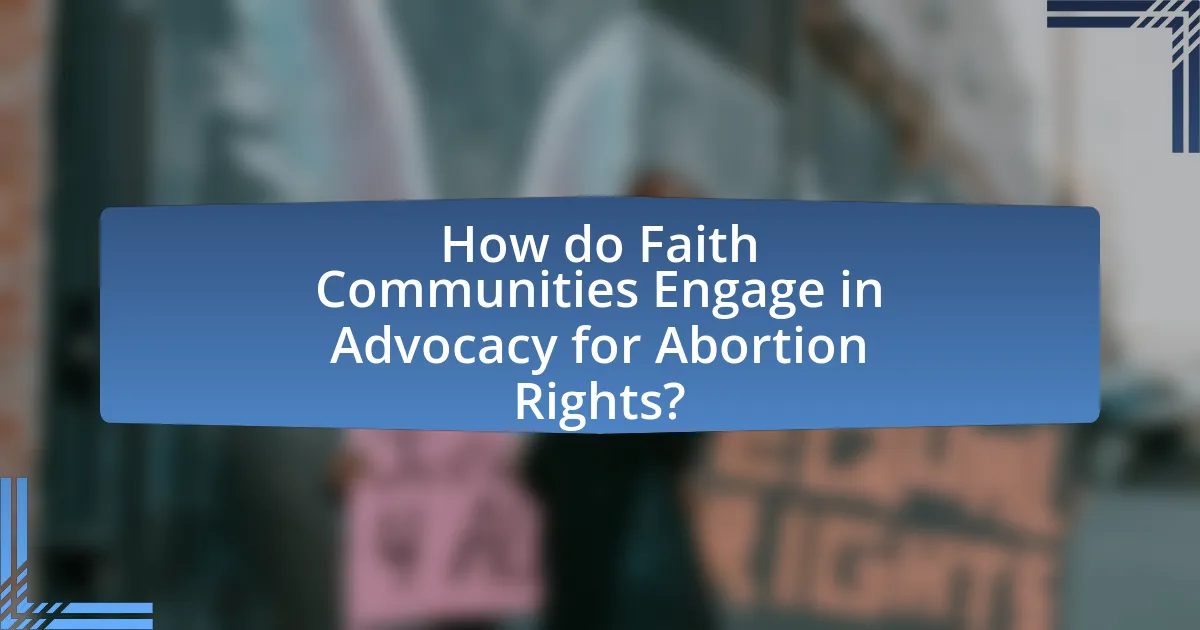
How do Faith Communities Engage in Advocacy for Abortion Rights?
Faith communities engage in advocacy for abortion rights through various methods, including public statements, grassroots organizing, and collaboration with reproductive health organizations. Many faith leaders articulate their support for abortion rights based on theological interpretations that emphasize compassion, justice, and women’s autonomy. For instance, the Religious Coalition for Reproductive Choice, which includes diverse faith traditions, actively campaigns for policies that protect reproductive rights and provides resources for congregations to discuss these issues. Additionally, faith communities often mobilize their members to participate in rallies, legislative advocacy, and educational initiatives, demonstrating their commitment to reproductive justice. This engagement is supported by research indicating that a significant number of religious individuals believe in the right to choose, reflecting a shift in traditional views within many faith groups.
What strategies do faith communities use to advocate for abortion rights?
Faith communities advocate for abortion rights through various strategies, including public education, interfaith coalitions, and legislative lobbying. These communities often organize workshops and discussions to raise awareness about reproductive health and rights, emphasizing the moral and ethical dimensions of access to abortion. For instance, organizations like the Religious Coalition for Reproductive Choice unite diverse faith groups to promote reproductive justice and influence public policy. Additionally, faith leaders may engage in direct lobbying efforts, contacting legislators to express support for pro-choice legislation, thereby leveraging their moral authority to impact political decisions. These strategies demonstrate the active role faith communities play in advocating for abortion rights, aligning their efforts with broader social justice movements.
How do faith leaders utilize their platforms to promote abortion rights?
Faith leaders utilize their platforms to promote abortion rights by advocating for reproductive justice through sermons, public statements, and community outreach. Many faith leaders emphasize the moral imperative of supporting women’s autonomy and health, framing abortion rights as a matter of social justice and compassion. For instance, organizations like the Religious Coalition for Reproductive Choice mobilize faith communities to engage in activism, highlighting that numerous religious texts can be interpreted to support a woman’s right to choose. This approach is reinforced by studies showing that faith-based advocacy can significantly influence public opinion and policy regarding reproductive rights.
What role do interfaith coalitions play in supporting abortion rights?
Interfaith coalitions play a crucial role in supporting abortion rights by uniting diverse religious groups to advocate for reproductive justice. These coalitions leverage their collective moral authority to challenge restrictive abortion laws and promote access to safe and legal abortion services. For instance, organizations like the Religious Coalition for Reproductive Choice bring together various faith traditions to emphasize that many religious beliefs support a woman’s right to choose. This collaborative approach not only amplifies the voices of those who support abortion rights but also fosters dialogue and understanding among different faith communities, thereby strengthening the overall movement for reproductive rights.
How do faith communities educate their members about abortion rights?
Faith communities educate their members about abortion rights through a combination of sermons, educational programs, and community discussions. These initiatives often include theological interpretations that align with the values of compassion and justice, emphasizing the importance of reproductive rights as part of social justice. For example, many faith leaders reference scriptural texts to support the idea that individuals have the right to make personal decisions regarding their bodies. Additionally, faith organizations may collaborate with reproductive health advocates to provide accurate information and resources, helping members understand the legal and medical aspects of abortion rights. This multifaceted approach ensures that members are informed and can engage in discussions about abortion rights within their communities.
What resources do faith communities provide to inform their congregations?
Faith communities provide various resources to inform their congregations, including educational programs, workshops, and literature on reproductive health and rights. These resources often encompass theological discussions, ethical considerations, and practical guidance related to abortion, aiming to foster informed decision-making among members. For instance, many faith organizations collaborate with health professionals to offer accurate information and support services, ensuring that congregants have access to comprehensive and reliable data. Additionally, faith communities may distribute pamphlets, host speaker events, and utilize online platforms to disseminate information, thereby enhancing awareness and understanding of abortion rights within their congregations.
How do faith-based organizations collaborate with reproductive health advocates?
Faith-based organizations collaborate with reproductive health advocates by engaging in dialogue, sharing resources, and participating in joint initiatives that promote reproductive health and rights. These organizations often leverage their community influence to raise awareness about reproductive health issues, advocate for policy changes, and provide support services. For instance, the Religious Coalition for Reproductive Choice unites various faith groups to advocate for reproductive rights, demonstrating how faith communities can align with health advocates to address issues such as access to contraception and safe abortion services. This collaboration is essential in creating a supportive environment for reproductive health discussions within faith communities.
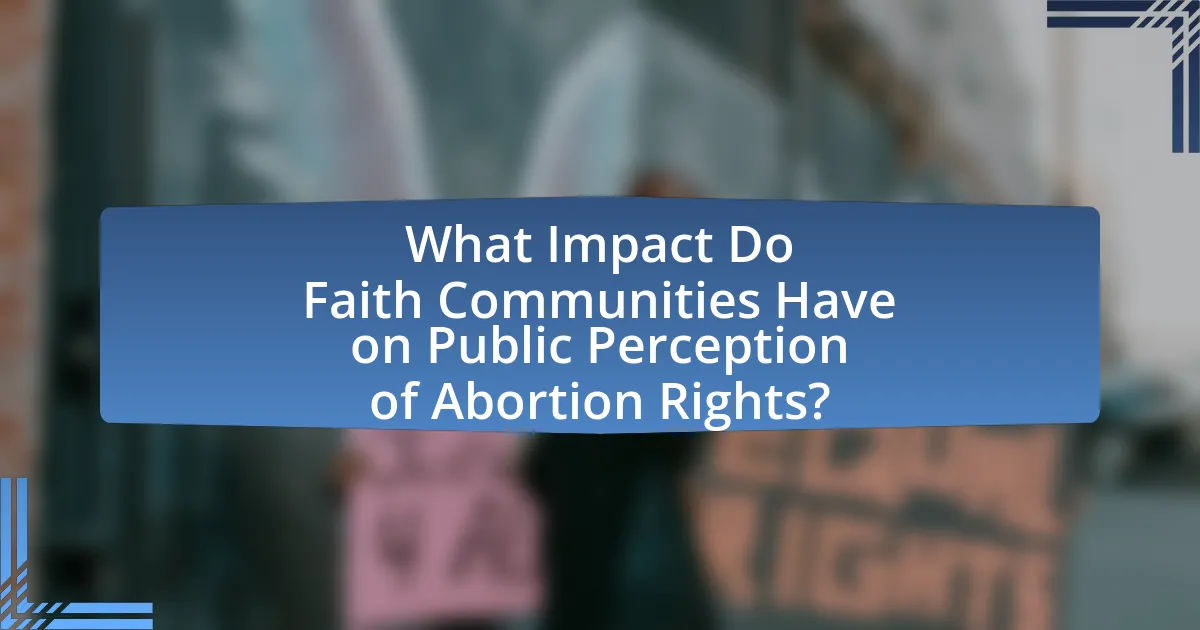
What Impact Do Faith Communities Have on Public Perception of Abortion Rights?
Faith communities significantly influence public perception of abortion rights by shaping moral and ethical viewpoints. Many religious organizations advocate against abortion, framing it as a moral issue, which can lead to increased stigma and opposition among their followers and the broader community. For instance, surveys indicate that individuals who regularly attend religious services are more likely to oppose abortion compared to those who do not. Additionally, faith leaders often mobilize their congregations to engage in activism, further solidifying anti-abortion sentiments. Conversely, some faith communities support abortion rights, emphasizing compassion and women’s autonomy, which can help normalize the conversation around reproductive choices and reduce stigma. This duality illustrates how faith communities can either reinforce or challenge prevailing attitudes toward abortion rights, ultimately impacting legislative outcomes and societal norms.
How do faith communities shape public discourse on abortion rights?
Faith communities shape public discourse on abortion rights by influencing moral perspectives and mobilizing advocacy efforts. These communities often frame the conversation around abortion through theological interpretations, emphasizing values such as compassion, justice, and women’s autonomy. For instance, organizations like the Religious Coalition for Reproductive Choice advocate for reproductive rights based on religious principles, thereby impacting public opinion and policy discussions. Additionally, faith leaders frequently engage in public speaking and community outreach, which can sway the beliefs and actions of their congregations and the broader society, as evidenced by surveys showing that religious individuals often align their views on abortion with the teachings of their faith communities.
What narratives do faith communities promote regarding abortion?
Faith communities promote narratives that often emphasize the sanctity of life, moral considerations, and compassion for individuals facing unplanned pregnancies. Many religious groups advocate for the belief that life begins at conception, leading to a strong opposition to abortion based on the idea that terminating a pregnancy is equivalent to taking a life. Conversely, some faith communities highlight the importance of personal choice, women’s rights, and the need for compassionate responses to complex situations, arguing that access to safe and legal abortion is a matter of health and justice. For instance, organizations like the Religious Coalition for Reproductive Choice advocate for reproductive rights from a faith-based perspective, emphasizing that moral and ethical considerations can support the right to choose. This duality in narratives reflects the diverse beliefs within faith communities regarding abortion, influenced by theological interpretations and social justice concerns.
How do faith communities counteract anti-abortion rhetoric?
Faith communities counteract anti-abortion rhetoric by promoting messages of compassion, understanding, and support for reproductive rights. Many religious organizations emphasize the importance of individual conscience and the moral agency of women, arguing that decisions regarding abortion should be left to the individual rather than dictated by external authorities. For instance, the Religious Coalition for Reproductive Choice advocates for reproductive justice and highlights the spiritual dimensions of personal choice, reinforcing the idea that faith can coexist with support for abortion rights. Additionally, faith leaders often engage in public discourse, challenging anti-abortion narratives by sharing personal stories and theological interpretations that affirm women’s rights to make choices about their bodies. This approach not only counters negative rhetoric but also fosters a more inclusive dialogue within faith communities and society at large.
What are the outcomes of faith community involvement in abortion rights advocacy?
Faith community involvement in abortion rights advocacy leads to increased support for reproductive health policies and greater awareness of women’s rights within religious contexts. This engagement often results in mobilizing congregations to advocate for legislative changes, as seen in various faith-based organizations that have publicly endorsed reproductive rights, such as the Religious Coalition for Reproductive Choice. Studies indicate that when faith leaders speak out on these issues, it can significantly influence public opinion and reduce stigma surrounding abortion, fostering a more supportive environment for individuals seeking reproductive health services.
How has faith community advocacy influenced legislation on abortion rights?
Faith community advocacy has significantly influenced legislation on abortion rights by mobilizing grassroots support and shaping public discourse. For instance, organizations like the Religious Coalition for Reproductive Choice have actively lobbied for reproductive rights, emphasizing moral and ethical arguments that resonate with both lawmakers and the public. Their efforts have contributed to the introduction and passage of pro-choice legislation in various states, as seen in the 2019 New York Reproductive Health Act, which was supported by numerous faith leaders advocating for women’s autonomy and health. This advocacy not only impacts legislative outcomes but also fosters a broader cultural acceptance of reproductive rights within faith communities, thereby reinforcing the political will to support such legislation.
What success stories exist from faith communities supporting abortion rights?
Faith communities have successfully advocated for abortion rights through various initiatives, demonstrating their commitment to reproductive justice. For instance, the Religious Coalition for Reproductive Choice, which includes diverse faith traditions, has mobilized congregations to support pro-choice legislation and provide resources for individuals seeking abortions. Additionally, the Unitarian Universalist Association has actively campaigned for reproductive rights, emphasizing the moral imperative of access to safe and legal abortion services. These efforts have contributed to increased awareness and support for abortion rights within religious contexts, showcasing the positive impact of faith communities in this area.
What practical steps can faith communities take to support abortion rights effectively?
Faith communities can support abortion rights effectively by advocating for reproductive justice, providing education on reproductive health, and offering support services for individuals facing unplanned pregnancies. Advocacy efforts can include lobbying for pro-choice legislation and participating in public demonstrations to raise awareness about reproductive rights. Education initiatives can involve organizing workshops and discussions that inform congregants about the importance of access to safe and legal abortion services. Additionally, faith communities can establish support networks that offer counseling, financial assistance, and resources for those in need, thereby creating a compassionate environment that respects individual choices. These actions align with the broader movement for reproductive rights, which emphasizes the importance of personal autonomy and access to healthcare.
